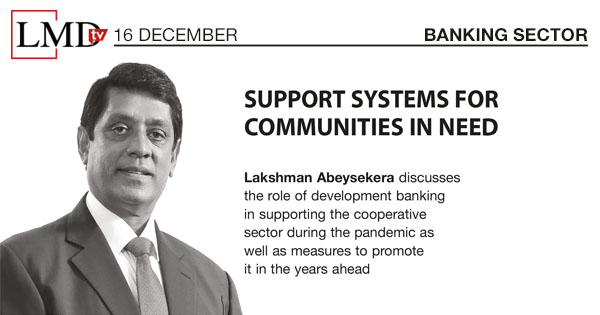“The cooperative sector has a major role to play in [mitigating] this pandemic especially in relation to agriculture and food supply chains,” observed SDB bank Chairman Lakshman Abeysekera.
In his view, prices have been among the major issues impacting the agriculture sector during the pandemic as well as supply chains for producers in this segment. He said this was particularly true for the cooperative sector – although the banking sector has been able to offer support; for example, to meet the working capital requirements of these businesses.
Moreover, he commended the performance of the cooperative sector during the pandemic, explaining that it was able to benefit from the support received: “The sector is establishing its food supply chain in addition to the private sector.”
However, Abeysekera also emphasised there are sectors that continue to need help, citing the impact of COVID-19 on the tourism industry among others and as a result, the informal segment that depends on them.
Commenting on steps that could be taken to help prop up rural communities, he highlighted the importance of establishing supply chains in addition to providing the necessary infrastructure, fertiliser, land and water to support the agriculture sector.
As for the SME sector, he stressed the importance of implementing a holistic strategy by authorities to address the present fragmentation of operations: “Many activities are undertaken by various agencies so everything must be consolidated with one strategy and support system.”
“On the other hand, the accountancy fraternity is advocating for the government to establish a credit guarantee institution to help these businesses with their financing needs,” he continued.
When it comes to education, Abeysekera noted that rural communities lack infrastructure and the facilities for online education – especially for schoolchildren – and would require support in obtaining the tools and instruments needed to engage in these activities.
“We must support the SME and cooperative sectors as unemployment continues to be a problem, as well as shutdowns due to the ongoing pandemic,” he remarked, stating that coping with the current scenario is difficult in certain sectors.
To address this, he pointed to the need for more than financial solutions such as managerial support.
Abeysekera considers the concept of collateral to be one of the challenges facing the development banking sector due to depositors’ funds being loaned. As such, this approach means they must look to balance these activities from a risk management perspective.
This challenge has prompted others to propose alternative systems as he cited professionals pushing for the introduction of a credit guarantee institution as well as other tools to support this system, which includes insurance.
However, there are measures to be taken from the banks’ side as Abeysekera pointed out: “We’re experimenting with cash flow-based lending since we have the means to closely monitor this online.”
As such, the development banking sector is equipped to introduce technology and concepts that would shift it away from collateral-based lending.
Furthermore, Abeysekera said there are initiatives geared to connect rural communities and develop their skills – including their financial literacy – as well as moves to introduce the seed or venture capital model for marginalised societies.
Expressing his opinion on the measures taken by the Central Bank of Sri Lanka to support the country’s economic recovery, Abeysekera believes these policies are sustainable in the medium term.
“It’s the duty of the banking community and the entire nation to support affected businesses,” he averred, elaborating: “This is why not only the banking sector but also professionals and the regulator have come forward to offer support. We see it as our duty and should be able to face these challenges together.”




